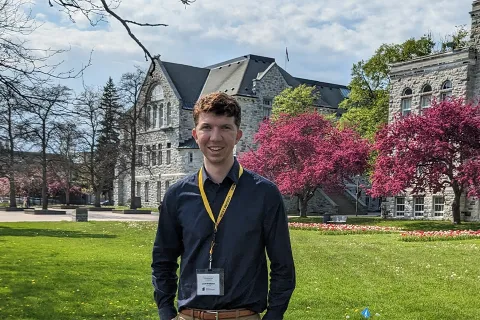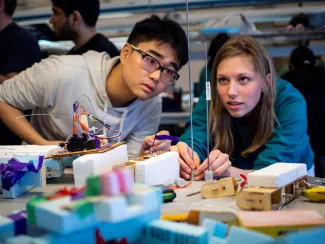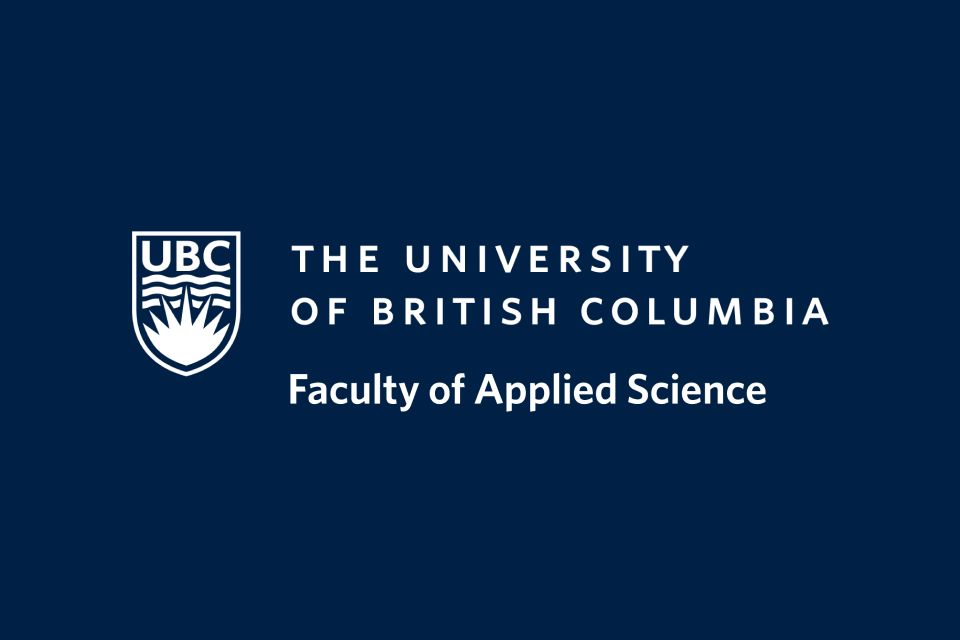"No matter how challenging the circumstances, you can create a positive impact by seeking out opportunities and striving to excel.”

Liam Krebbers
- Degree: Bachelor of Applied Science
- Grad year: 2024
- Program:
- Campus: Okanagan
I recently graduated from UBC Okanagan School of Engineering’s Bachelor of Applied Science program, where I was honoured to receive the Governor General's Medal for having the highest GPA in my graduating class. My passion for education was profoundly shaped by a traumatic brain injury I suffered at the age of ten, which caused me to miss almost two years of school. This experience underscored the importance of school not only as a place for learning but also as a community for building connections and accessing diverse opportunities.
Throughout my bachelor's degree, I have strived to seize every opportunity presented to me. In 2022, I joined the Combustion for Propulsion and Power Laboratory, where I began researching technology to safely integrate hydrogen into our natural gas supply. This research has enabled me to be the lead author of two journal papers and three conference papers, which I have presented at two national and one international conferences. Moving forward, we are working to commercialize our research and are thankful for companies like FortisBC who have supported us. I am incredibly excited to continue to study combustion at Princeton University where I will be pursuing a PhD in Mechanical and Aerospace Engineering, and have been awarded a major entrance scholarship.
"Throughout my life I have always been ambitious, but I realized the true impact of education following a traumatic brain injury. When I was ten years old, I crashed while ski racing and was forced to spend a month at BC Children's hospital and miss almost two years of school. As I recovered I helped raise money for the children's hospital, by speaking with donors, performing a TV interview, and being a guest speaker at a gala. Ultimately I won the BC Children's Hero of Ability award for both my resilience and my drive to give back. My inability during this period to attend school, learn and ultimately build relationships showed me the power of education. It has been one of my driving reasons for pursuing higher education, and has significantly contributed to my goal of becoming a professor."
Why did you choose to go into Mechanical Engineering at UBC Okanagan?
As someone who grew up in Kelowna, I have always known how beautiful Okanagan was. I saw myself as extremely lucky that my home town had a superb mechanical engineering program. In particular I was interested in the development of developing new technology to reduce global emissions. UBC Okanagan has a number of industry leading professors working on everything from decarbonizing combustion to the development of more effective solar panels. I was also awarded UBC’s most prestigious entrance scholarship, the presidential scholars award. This scholarship enabled me to focus on my studies rather than on the cost of tuition, and ultimately contributed to my choice of UBC.
What advice would you give an incoming engineering student?
The biggest piece of advice that I would give to incoming students is to take part in activities beyond the course work. In my opinion, the true strength of studying engineering at UBC is the access it provides to industry leading experts through programs like co-op, NSERC USRA and work study. In particular, I would recommend any students who are interested in pursuing a Masters or PhD to reach out to the professors of classes that they enjoyed about research opportunities. This enabled me to not only explore my passion for clean energy research but also helped me decide if graduate studies were right for me. Furthermore, when I was applying for graduate schools the research experience I had gained during my undergraduate program was instrumental in gaining acceptance to top universities including Princeton, Stanford and Oxford.
Where do you find your inspiration for using your degree to make an impact on our world?
During the second year of my program, I took a thermodynamics class taught by Dr. Sina Kheirkhah, and was amazed by the combustion research that was going on at UBCO. After class, I reached out to him about undergraduate research opportunities and joined the Combustion for Propulsion and Power Laboratory. Working in the lab has been a phenomenal experience, I have had the opportunity to explore research as a career while working on developing cutting edge new technology that will enable the safe integration of hydrogen into our natural gas supply. Dr. Kheirkhah has been a superb mentor, and has made strides to empower his undergraduate students. With his support I have now had the opportunity to be one of extremely few undergraduate students to attend combustion conferences, and to be entrusted to be the lead author of academic papers. Ultimately, my experience working with him has inspired me to study combustion during my PhD.
What are your future plans to make a difference in our world?
I have been incredibly fortunate to be involved in developing clean energy technology at UBC in the Combustion for Propulsion and Power Laboratory. My experience in the lab has enabled me to develop technology that will allow for furnaces and gas turbines to operate safely as hydrogen is phased into the natural gas supply. We are incredibly excited to work with our partners like FortisBC to further develop and commercialize this technology. The superb courses at UBCO have enabled me to pursue a PhD at Princeton University where I will focus on the development of technology to decarbonize the power grid while leveraging existing natural gas infrastructure. For me, excellent members of the UBCO faculty like Dr Kheirkhah have been one of my inspirations to pursue my PhD in combustion. As I go forward in my education, I want to ultimately become a research professor so I can not only reduce global emissions, but also to make the same impact on the next generation of students.
How did your studies in the Faculty of Applied Science prepare you for the future of work?
The professional engineering landscape has changed sharply particularly since the covid-19 pandemic. I think having been a student who spent the first year of my degree online, I am now much better prepared for the remote or hybrid working styles that have become increasingly common. Furthermore, as engineering has increasingly transitioned away from hand calculations and towards computer modelling and simulations I believe it is exceptionally important to be well versed in each of these areas. Fortunately, UBC provided a wide array of pertinent classes ranging from computational fluid dynamics and finite element analysis to CAD and 3D modelling that will enable students like me to thrive as the field continues to evolve.




